
Is the Pharmaceutical Sector in Saudi Arabia Unlocking the Full Potential of Online Visibility and E-Reputation?
In today’s digital-first landscape, a pharmacy’s online reputation and local visibility can strongly influence a…
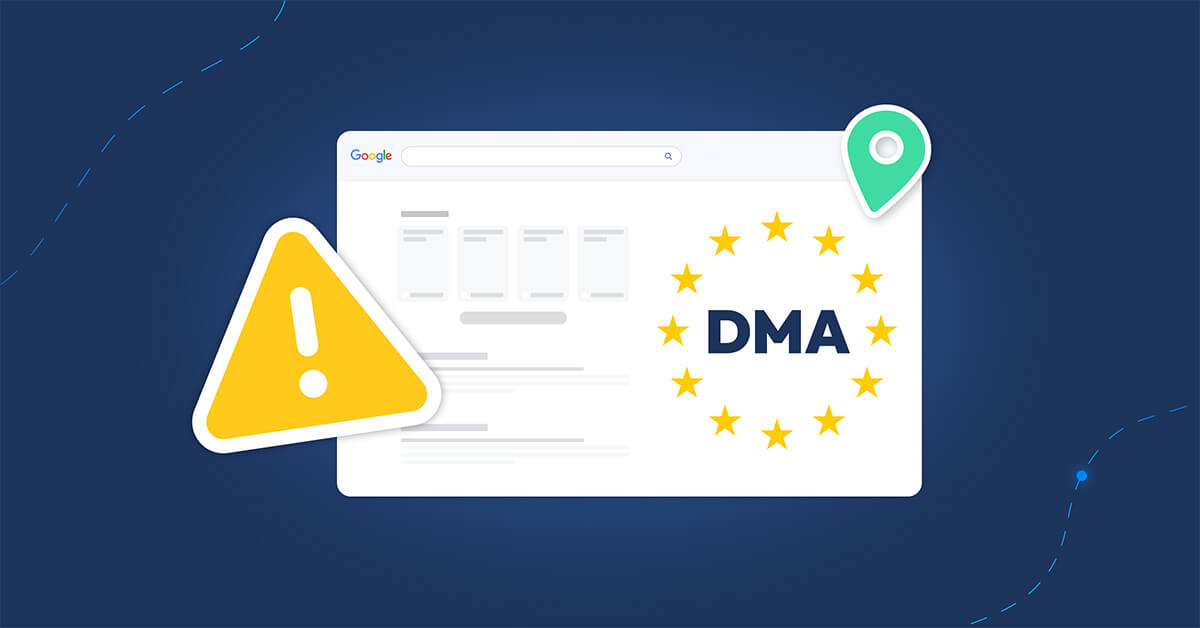
Table of contents
On January 17, 2024, Google announced it would make several changes to its search engine to comply with the DMA. By March 6, 2024, the effective date of this new European legislation, modifications should appear in our search results. Find out what changes are expected!
The Digital Markets Act (DMA) is European Union legislation aimed at regulating the power of “Very Large Online Platforms” (VLOPs), often considered as “gatekeepers” or access controllers to the digital market.
The DMA seeks to ensure fair competition by imposing specific obligations on large tech companies, such as transparency and refraining from anti-competitive practices.
The DMA aims to counter the anti-competitive practices of VLOPs and limit the inequalities resulting from their dominance over the digital market.
The GAFAM in particular (Google, Apple, Facebook, Amazon, and Microsoft), hold a quasi-monopoly through often obscure algorithms that prioritise their own products (like Google prioritising Local Pack Google My Business results).
VLOPs are thus accused of monopolising a vast part of the European digital landscape, making competition nearly impossible for small and medium-sized businesses.
The DMA aims to:
For consumers, the DMA also aspire to ensure greater transparency in data collection and use, while empowering users in their platform choices (default browser choice, the ability to uninstall pre-installed applications on their smartphones, etc.).

DMA and DSA, what’s the difference?
You might hear about both together, but they are distinct European regulations, though they go hand in hand.
The DMA strives to combat the monopoly and unfair competition exercised by VLOPs.
The Digital Services Act (DSA), on the other hand, fights against misinformation and the spread of illegal content such as hate speech, child pornography, terrorism, fake reviews, or fake Google listings on online platforms. In summary, the DSA aims to ensure that online content complies with current regulations.
You might hear about both together, but they are distinct European regulations, though they go hand in hand.
The DMA strives to combat the monopoly and unfair competition exercised by VLOPs.
The Digital Services Act (DSA), on the other hand, fights against misinformation and the spread of illegal content such as hate speech, child pornography, terrorism, fake reviews, or fake Google listings on online platforms. In summary, the DSA aims to ensure that online content complies with current regulations.
The “gatekeepers” identified by the European Commission are six. Among these web controllers, we find:
Indeed, it’s hard to imagine navigating the web without using at least one platform from these six giants!
And these are not the only ones: other big names in e-commerce or online booking are also targeted by the DMA measures. Alibaba, Booking.com, and Zalando are among the platforms that are in the sights of the European Commission.
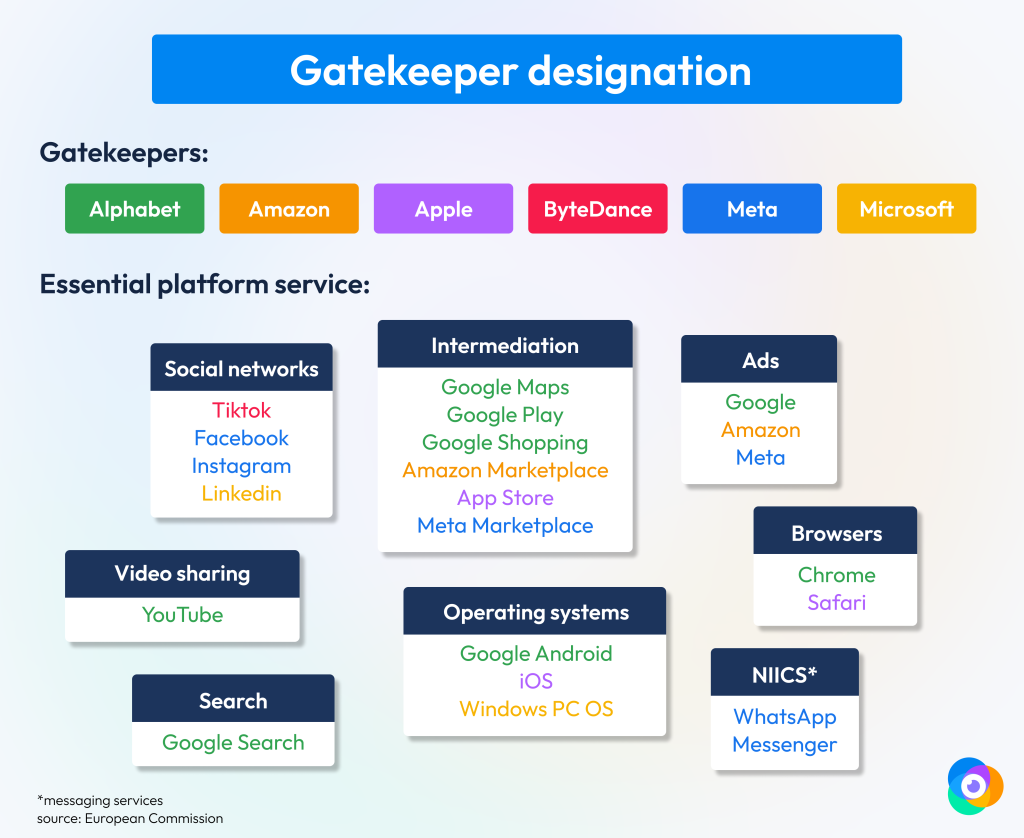
Google is preparing for the implementation of the DMA by initiating and testing changes to its products to comply with the new European regulations.
You will find all the adjustments in this Google blog article.
Google is rolling out modifications to its search result page in Europe, including:
For certain categories, like hotels, Google plans to test a dedicated space for comparison sites and providers to display more detailed individual results (images, star ratings, etc.).
These changes will lead to the removal of some search page functionalities, such as the “Google Flights” section.
In compliance with the DMA, Google is required to present additional choice screens allowing users to easily switch search engines or default browsers on Android phones. Google plans to make these screens more visible during the setup of an Android phone and in the Chrome app, on desktops, and on iOS.
In the coming weeks, Google users in Europe will see an additional consent banner, enabling them to choose if certain services can continue to share data (used for content or personalised ads within Google products). Users will be able to change their preferences freely in their account.
Google already allows users to download or transfer their data from 80 different products. To meet the DMA’s requirements for data portability to third-party apps or services, Google will soon test a data portability API for developers.
Even before the March 6 deadline, Google is making modifications to the search results pages to conduct tests before adopting these DMA compliance measures. Changes that are bound to evolve over time.
The main change in terms of display involves the emergence of a new section of results that rises above the traditional local pack: the Places sites.
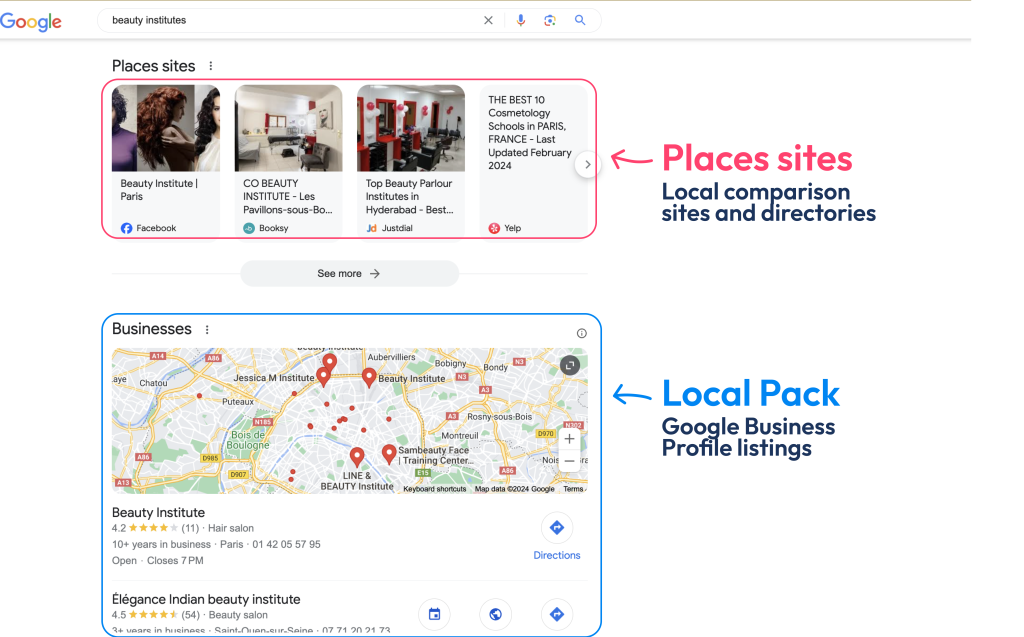

Note:
This display being in testing phase, the order of the different blocks may change. So, it is possible that the “Places sites” insert may appear below the Local Pack in the future.
This display being in testing phase, the order of the different blocks may change. So, it is possible that the “Places sites” insert may appear below the Local Pack in the future.
Places sites are carousels of comparison websites, local directories, and brand sites. They are classified into several categories: brand sites, major directories, rare and specialised directories.
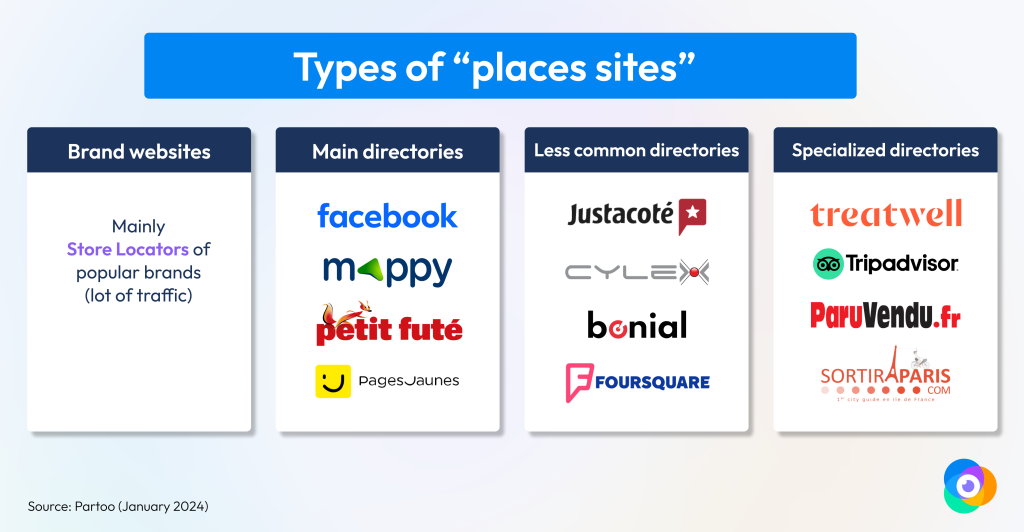
With this new display, Google is thus seeking to comply with the DMA by granting more visibility to directories and comparison sites, as well as to all the businesses they list.

Did you know?
Having a Store Locator on your website is the best way to improve the position of your brand in the places sites block!
Having a Store Locator on your website is the best way to improve the position of your brand in the places sites block!
Probably you have already noticed it: Google is making tests on customer reviews and is currently displaying reviews from other platforms.
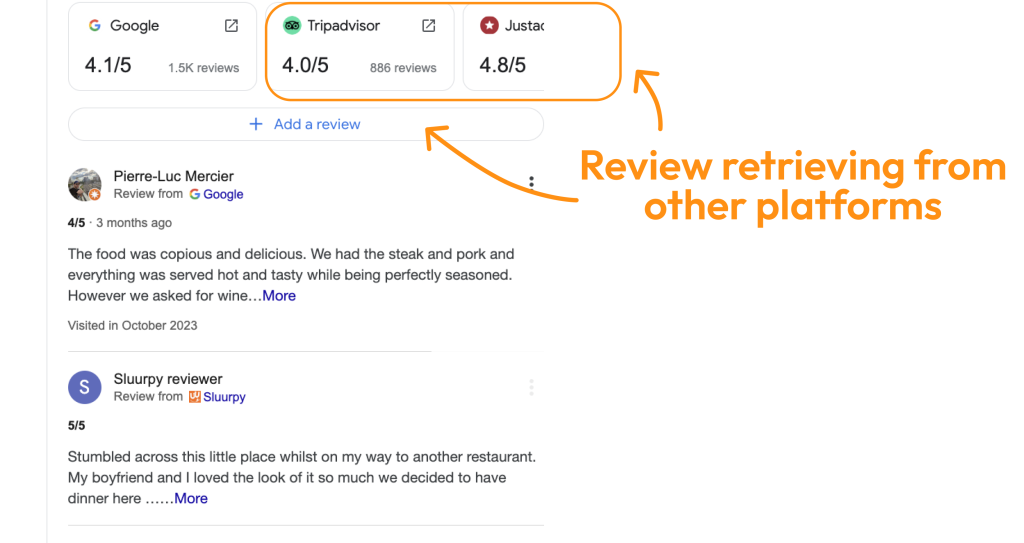
To comply with the DMA, Google seems to have revised the review section of its business listings. Instead of only showing reviews published on the listing, the search engine now redirects users to a new query “business + reviews,” allowing them to access reviews published across all websites without leaving the business listing. It is now possible to consult reviews from UberEats, TrustPilot, or TripAdvisor directly from a Google Business Profile listing. If the company’s rating or reviews are integrated into its Store Locator, it is also possible to see it appear in the review section.
Businesses will have to get used to a lot of uncertainties about the evolution of Search in the coming years. The major advancement concerns Google’s new interface based on artificial intelligence (AI), Google SGE.
As for the Local Pack, there’s no need to worry: to date, there is no question of replacing it with Google SGE. However, the three listings should appear below the results proposed by Google’s AI.
Moreover, more establishments might be highlighted with this new configuration:
This new “SGE Pack” could therefore be added to the old Local Pack, allowing 8 businesses to be highlighted by the search engine.

Note:
Google SGE is not yet available in Europe and is still in the experimental phase in the United States.
Google SGE is not yet available in Europe and is still in the experimental phase in the United States.
It seems that Google has decided to leave the choice to users whether or not to use Google SGE, allowing them to activate or deactivate the feature via its Google Labs interface. A decision that seems to align with the DMA, by giving users more freedom in how their search results are displayed!
These display changes seem to reshuffle the deck in terms of online visibility for businesses. Could the places sites block overshadow the traditional Local Pack?
The millions of businesses with a Google listing can be reassured: Google Business Profile has not had its final say!
While it’s true that the position of the Local Pack might be lowered in the search results, it remains attractive to users. Nearly one in two searches on Google ends in a “no click search,” meaning a search where the user doesn’t click on any links.
The Local Pack, therefore, has the significant advantage of revealing key data at a glance and speeding up the information gathering of potential customers. Moreover, it’s a display that users have been consulting for years: it’s hard to imagine they will lose the habit of checking it!
The integration of the Local Pack into Google’s experiments with the Search Generative Experience (SGE) also shows that the American giant does not plan to abandon this product anytime soon and is even incorporating it from the start into these AI-based search result evolutions. This should reassure the future of Google Business listings!
Whether it’s the places sites or the display of other review platforms, these search result evolutions only concern Google Search. Indeed, Google Maps is not affected by these changes at all.
This is good news for your business, since 50% of local searches directly go through Google Maps (according to a Partoo study conducted in 2023 on 10 billion business listing views).
It is therefore important to put into perspective the importance of this new model, which ultimately only concerns half of the local business searches.
Compliance with the Digital Markets Act by gatekeepers, including Google, will cause many changes in online visibility. It’s important to anticipate these changes and adapt your marketing strategy accordingly.
It’s more crucial than ever to enrich and keep your business listings up to date.
Despite the many display changes observed (sites for links, SGE, etc.), one thing remains constant: it’s the information on these listings that continues to be THE primary source of data on which Google relies to reference you.
Whether it’s traditional local SEO or appearing in these new channels, make sure to complete your data, add photos, and reply to your reviews.
Don’t rely solely on Google for your online presence! These changes related to the DMA may be an opportunity for you to explore other visibility levers, such as Apple Business Connect for better referencing on Apple Maps, or to consider registering in the WhatsApp Business directory.
Relying on a Presence Management tool like Partoo’s is also a good way to bet on directories that are already referenced in the Sites for places highlighted by Google. Justacoté, Hoodspot, Foursquare… are directories where your information is automatically updated!
The Store Locator is a real digital showcase for your points of sale, containing the most important information about your establishments (address, opening hours, phone number, services offered, etc.). On the one hand, you help your customers find you more easily, on the other hand, search engines will reference you better.
It’s now not uncommon to see a Store Locator appear in the places sites section of a search results page. A trend that will naturally intensify when Google compares the up-to-date information of a Store Locator with the incorrect information of a free directory. An optimised Store Locator will be favored by Google.
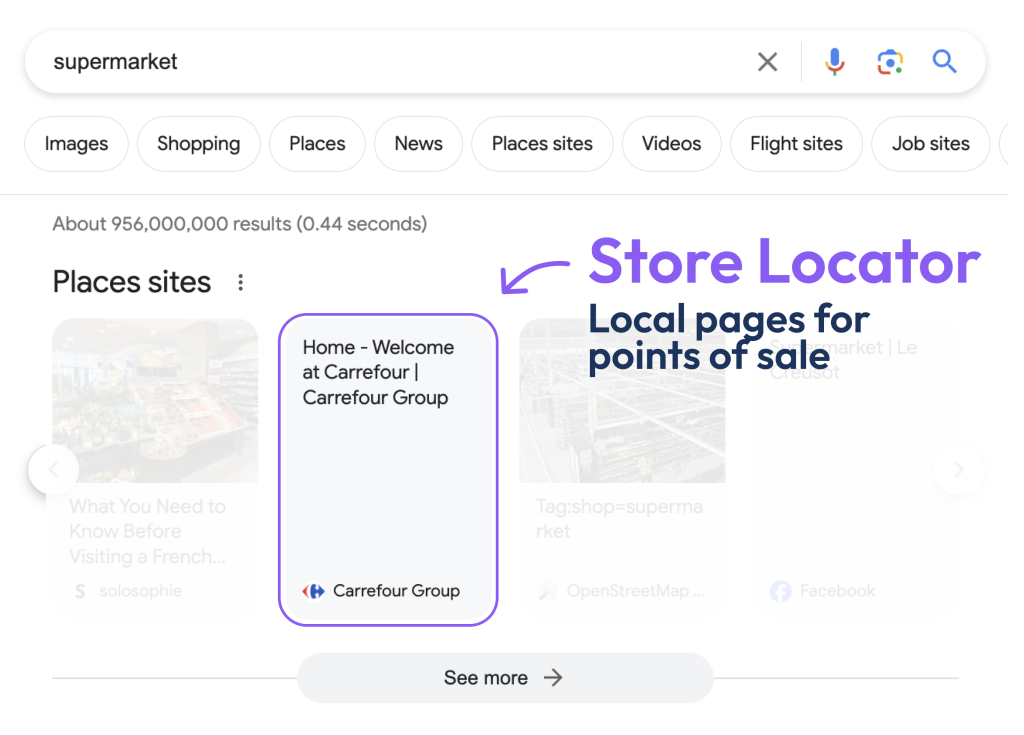
The pages of your Store Locator are also going to be displayed in the local search results, sometimes even higher than the places sites and the Local Pack.
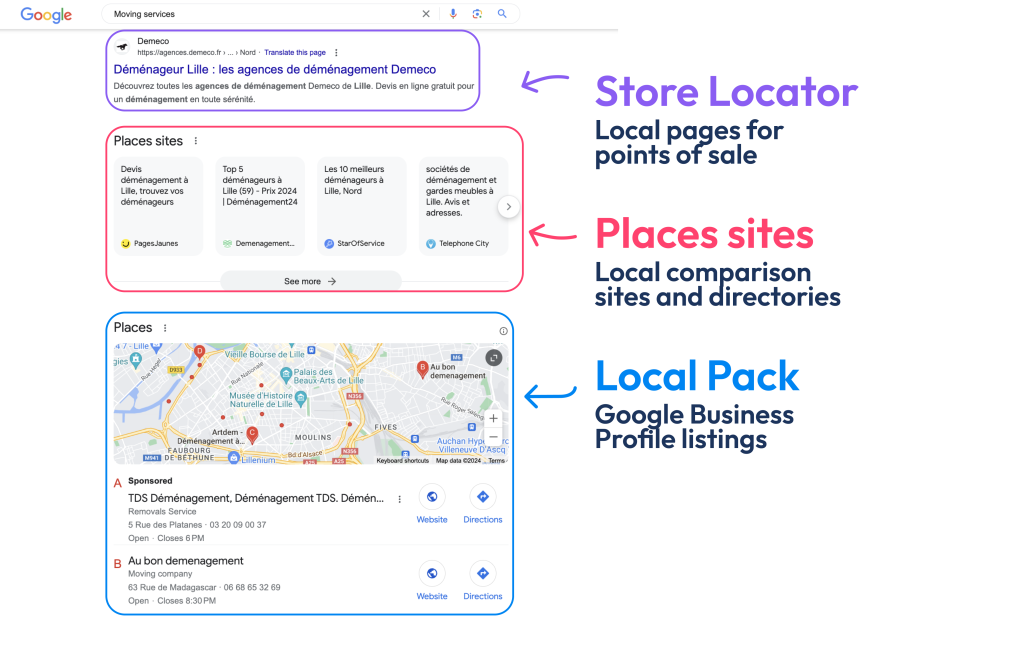
 What to remember
What to rememberIt is important to stay alert to upcoming changes: with Google in the testing phase, more developments can be expected before the DMA comes into effect in March.
Worried about the impact of the DMA on your business’s SEO? Discuss with a Partoo expert to review your local visibility strategy!
Want to easily develop your business through the Internet? It’s possible thanks to Partoo!
Receive our best articles and practical guides directly in your inbox every month